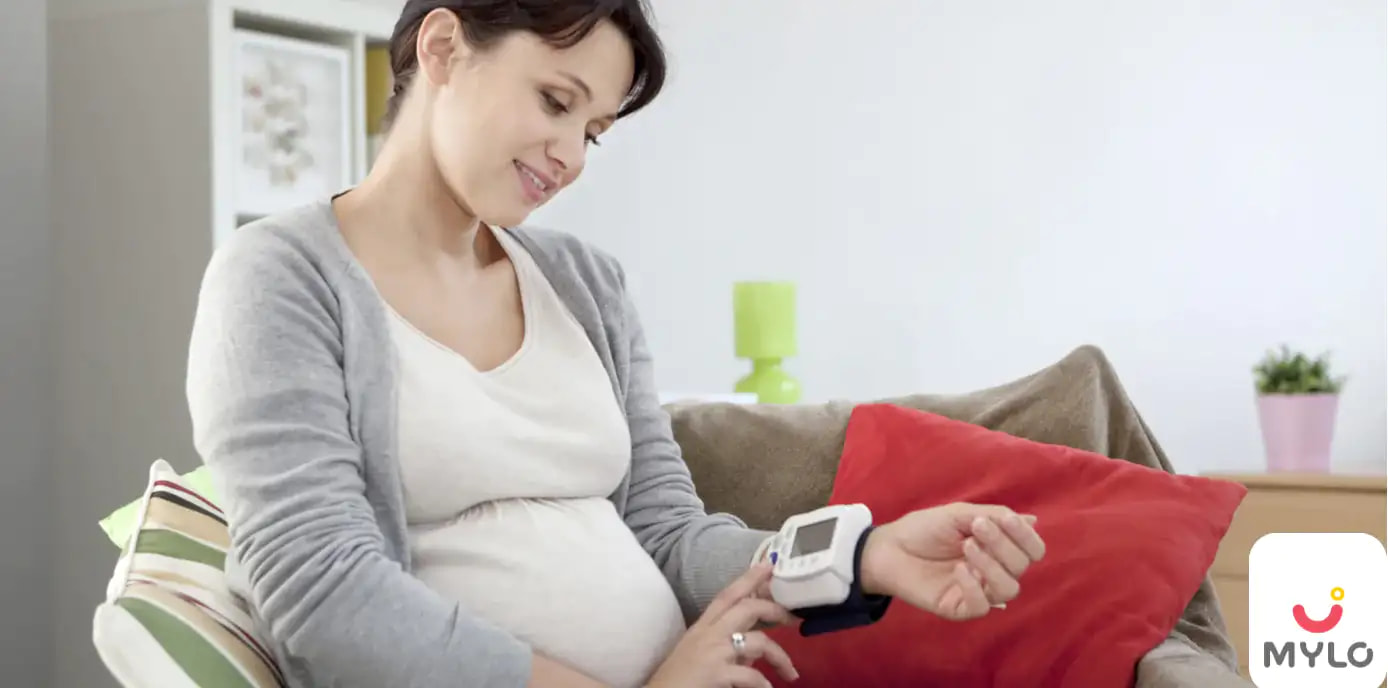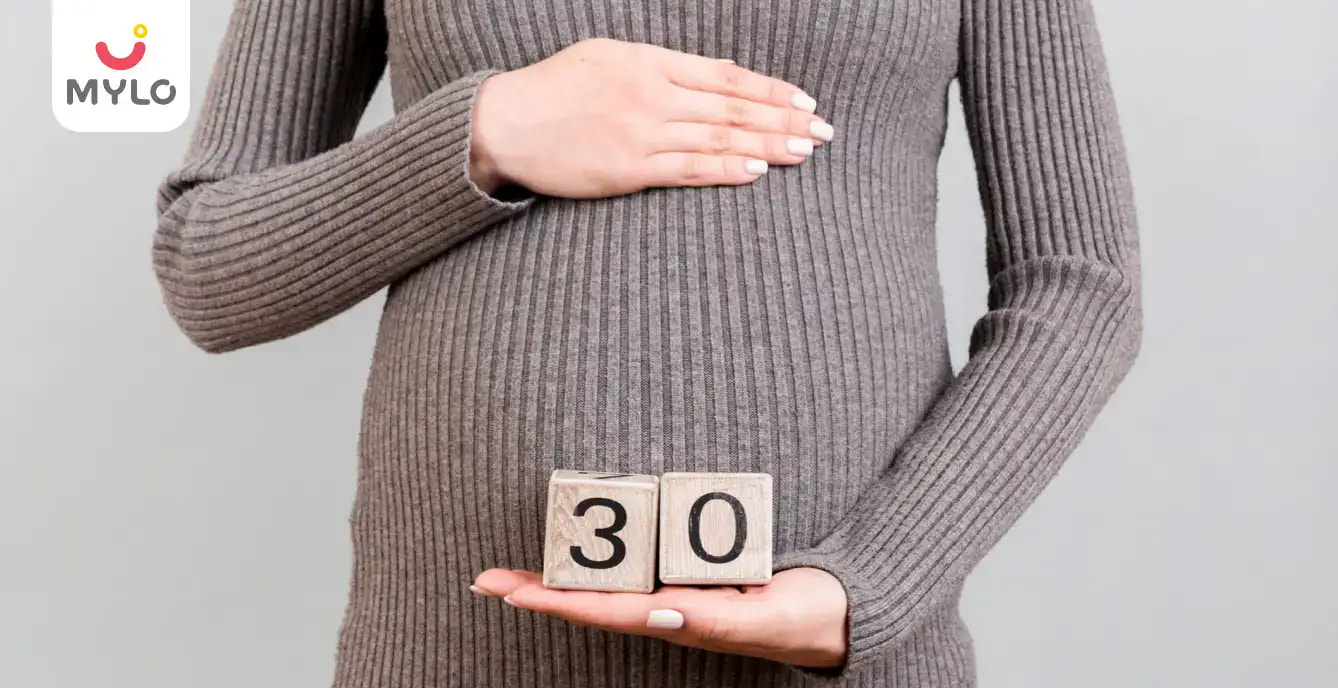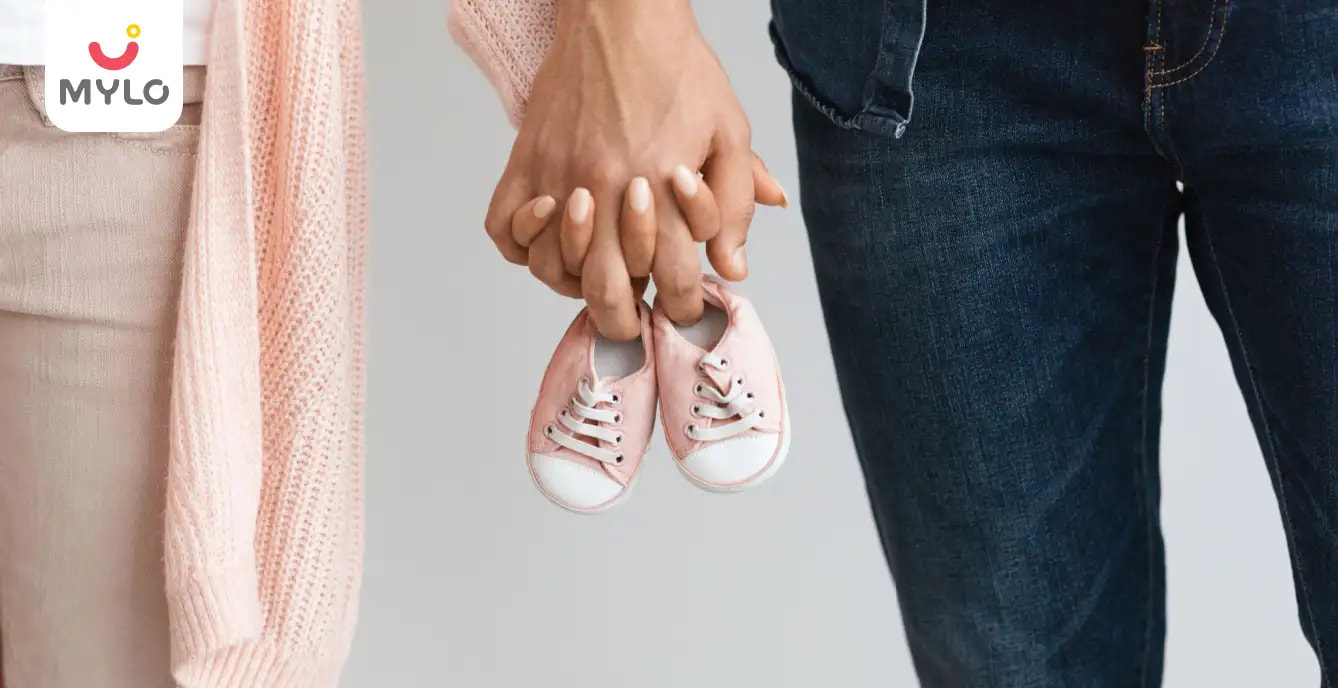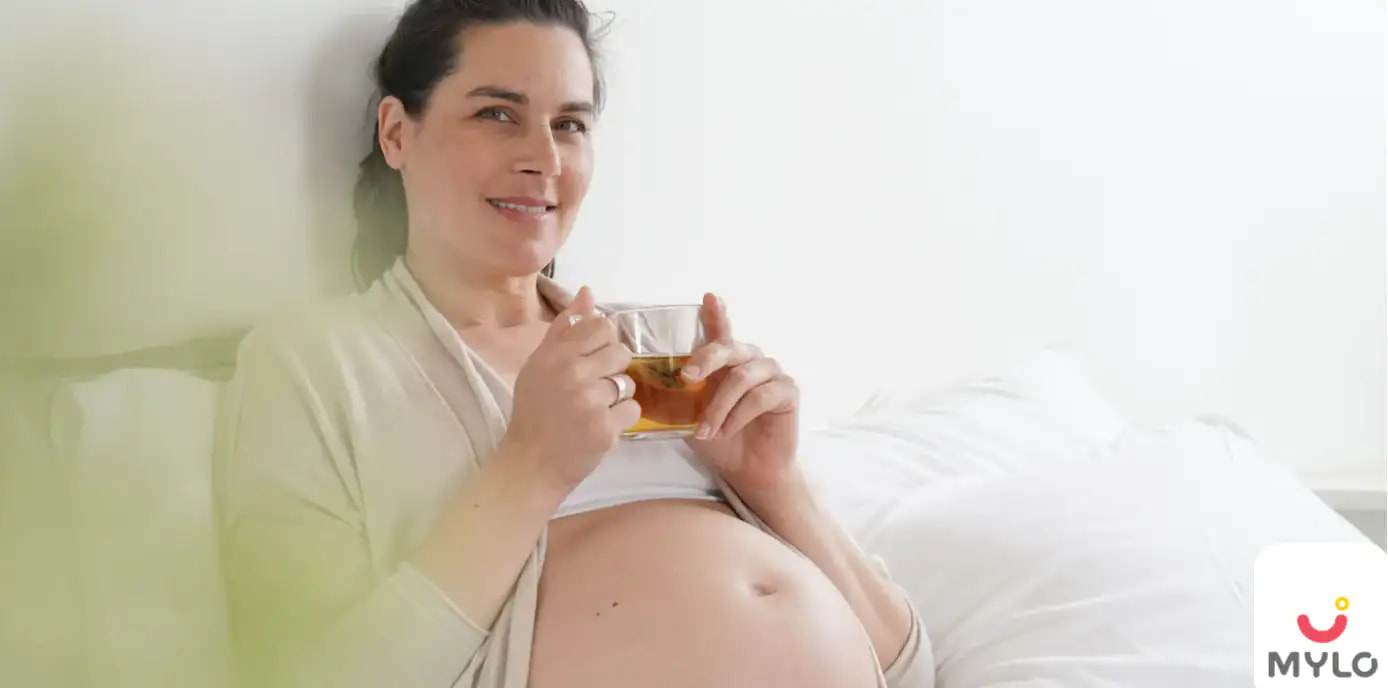Home

Everything You Need to Know About Pregnancy at 30 and the Risks Involved
In this Article

Pregnancy
Everything You Need to Know About Pregnancy at 30 and the Risks Involved
Updated on 3 November 2023
The number of women giving birth in their thirties is increasing day by day. Read on to learn about the possible risks a pregnant woman over the age of 30 may face and the precautions women need to take to enjoy a healthy pregnancy in their thirties.
Late pregnancy is a highly discussed and debated topic, especially among today’s professionally ambitious women. Many are worried about conceiving after the age of thirty. Let us explore this topic thoroughly and try to get rid of misconceptions.
Nowadays, women are marrying late compared to the past decades. The common age of marriage for girls used to be around 22 years, which has now gone up to 27 years or even higher. Family planning and conceiving come even later. As a result, the number of women giving birth in their thirties is increasing day by day.
When a woman conceives well into her thirties, she needs to plan her pregnancy better to medical complications. The first step towards self-care is following a balanced and nutritious diet. Additionally, it is recommended to stop smoking or consuming alcohol when you are pregnant.
Certainly, there are some risks women often face in their late pregnancy, such as:
-
Miscarriage
-
Twins (which some may not consider a risk or problem and some may)
-
High Blood Pressure
-
Gestational Diabetes
-
Difficult labour
Some risks involved in pregnancy after 30
Here are some risks women above the age of 30 may experience during their pregnancy:
1. Miscarriage
Pregnant women in their thirties are vulnerable to a high risk of miscarriage (early pregnancy loss). For all pregnant women, the first three months (commonly called the first trimester) are very critical.
2. Birth Defects
There can be birth defects in late pregnancy. As women age, the risk of chromosome problems also increases, and there is a risk of having a baby with missing, damaged, or extra chromosomes. For instance, down syndrome is one of the most common chromosome problems that arises with late childbearing.
3. Multiple Pregnancies
In women over the age of 30, there is an increased risk of multiple pregnancies, such as twins or triplets. The reason for multiple pregnancies is that as the ovaries age, they are more likely to release more than one egg during ovulation every month. Subsequently, multiple pregnancies carry a risk of preterm or premature birth.
4. High Blood Pressure
Nowadays, high blood pressure has become a prevalent problem. Whether women conceive at the age of 25-30 or later, high blood pressure has become common among women of all age groups. Therefore, when you are late in your pregnancy, you must be extra cautious of your daily salt intake. You should keep decreasing your salt intake from the very first day of your pregnancy.
5. Gestational Diabetes
Another complication women may have to face in late pregnancy is gestational diabetes. It is becoming a common problem for older women. For this, you must consult a good obstetrician-gynaecologist about the diet to follow before you get pregnant and even throughout the course of your pregnancy.
Risk Factors of Pregnancy at 30
Women may experience the following problems while getting pregnant at 30 or above:
1. Trouble in conception
Starting in their early 30s, women begin to become less fertile. As a result, it may take them longer to get pregnant.
2. Complications during pregnancy
Women in the 30 years or more category are prone to a higher risk of diabetes and high blood pressure during pregnancy. Additionally, women over 30 are more likely to have multiple pregnancies.
3. Complications during delivery
Pregnant women are more likely to deliver babies via caesarean section. Additionally, women who have their first baby after age 30 are at an increased risk of other delivery complications, such as prolonged labour.
Chances of pregnancy at the age of 30 years or older
The chances of getting pregnant start declining as women turn 30. The number of eggs in ovaries decreases as women get older, thereby affecting fertility According to a recent study, it simply means that if 100 fertile women aged 30 years or older try to get pregnant, in 1 cycle, only around 20 will be successful, and the others will have to try again.
Summary
Late pregnancy is becoming common with changes in lifestyle and priorities. Women wish to pursue their career goals and live life, before settling down or taking on the responsibility of raising a child. Soon, pregnancies at 30 years of age or older will become the norm.
So, it's not like you can't have a healthy pregnancy or a healthy child if you are planning pregnancy at the age of 30, provided you take care of your health and diet. You may also opt for prenatal testing after consulting with your obstetrician-gynaecologist.
References
- Cavazos-Rehg PA, Krauss MJ, Spitznagel EL, et al; (2013). Maternal age and risk of labor and delivery complications. www.ncbi.nlm.nih.gov
- Lampinen, R; Vehviläinen-Julkunen; K and Kankkunen, P. (2009). A Review of Pregnancy in Women Over 35 Years of Age. www.ncbi.nlm.nih.gov



Written by
Priyanka Verma
Priyanka is an experienced editor & content writer with great attention to detail. Mother to an 11-year-old, she's a ski
Read MoreGet baby's diet chart, and growth tips

Related Articles
Related Questions
Hello frnds..still no pain...doctor said head fix nhi hua hai..bt vagina me pain hai aur back pain bhi... anyone having same issues??

Kon kon c chije aisi hai jo pregnancy mei gas acidity jalan karti hain... Koi btayega plz bcz mujhe aksar khane ke baad hi samagh aata hai ki is chij se gas acidity jalan ho gyi hai. Please share your knowledge

I am 13 week pregnancy. Anyone having Storione-xt tablet. It better to have morning or night ???

Hlo to be moms....i hv a query...in my 9.5 wk i feel body joint pain like in ankle, knee, wrist, shoulder, toes....pain intensity is high...i cnt sleep....what should i do pls help....cn i cosult my doc.

Influenza and boostrix injection kisiko laga hai kya 8 month pregnancy me and q lagta hai ye plz reply me

Related Topics
RECENTLY PUBLISHED ARTICLES
our most recent articles

Diet & Nutrition
গর্ভাবস্থায় আলুবোখরা: উপকারিতা ও ঝুঁকি | Prunes During Pregnancy: Benefits & Risks in Bengali

Diet & Nutrition
গর্ভাবস্থায় হিং | ঝুঁকি, সুবিধা এবং অন্যান্য চিকিৎসা | Hing During Pregnancy | Risks, Benefits & Other Treatments in Bengali

Women Specific Issues
স্তনের উপর সাদা দাগ: লক্ষণ, কারণ এবং চিকিৎসা | White Spots on Nipple: Causes, Symptoms, and Treatments in Bengali

Diet & Nutrition
গর্ভাবস্থায় পোহা: উপকারিতা, ধরণ এবং রেসিপি | Poha During Pregnancy: Benefits, Types & Recipes in Bengali

Diet & Nutrition
গর্ভাবস্থায় মাছ: উপকারিতা এবং ঝুঁকি | Fish In Pregnancy: Benefits and Risks in Bengali

Diet & Nutrition
গর্ভাবস্থায় রেড ওয়াইন: পার্শ্ব প্রতিক্রিয়া এবং নির্দেশিকা | Red Wine During Pregnancy: Side Effects & Guidelines in Bengali
- ইনার থাই চ্যাফিং: কারণ, উপসর্গ এবং চিকিৎসা | Inner Thigh Chafing: Causes, Symptoms & Treatment in Bengali
- গর্ভাবস্থায় ব্রাউন রাইস: উপকারিতা ও সতর্কতা | Brown Rice During Pregnancy: Benefits & Precautions in Bengali
- Velamentous Cord Insertion - Precautions, Results & Safety
- Unlock the Secret to Flawless Skin: 7 Must-Have Qualities in a Face Serum
- Unlock the Secret to Radiant Skin: How Vitamin C Serum Can Transform Your Complexion
- Gender No Bar: 10 Reasons Why Everyone Needs a Body Lotion
- Unlock the Secret to Radiant Skin How to Choose the Perfect Body Lotion for Your Skin Type
- Top 10 Reasons to Apply a Body Lotion After Every Bath
- Communication in Toddlers: Milestones & Activities
- How to Improve Vocabulary for Toddlers?
- A Comprehensive Guide to Understanding Placenta Accreta
- Vulvovaginitis in Toddlers Causes, Symptoms and Treatment
- A Comprehensive Guide to Understanding Cerebral Palsy in Children
- Bitter Taste in Mouth During Pregnancy: Understanding the Causes and Remedies


AWARDS AND RECOGNITION

Mylo wins Forbes D2C Disruptor award

Mylo wins The Economic Times Promising Brands 2022
AS SEEN IN

- Mylo Care: Effective and science-backed personal care and wellness solutions for a joyful you.
- Mylo Baby: Science-backed, gentle and effective personal care & hygiene range for your little one.
- Mylo Community: Trusted and empathetic community of 10mn+ parents and experts.
Product Categories
baby carrier | baby soap | baby wipes | stretch marks cream | baby cream | baby shampoo | baby massage oil | baby hair oil | stretch marks oil | baby body wash | baby powder | baby lotion | diaper rash cream | newborn diapers | teether | baby kajal | baby diapers | cloth diapers |








